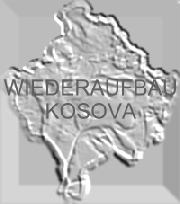Inhalts-Verzeichnis
Kosovo + Kosova = Kosov@
werden vermittelt bei

http://www.osnabrueck.
netsurf.de:8080/~dbein/
wiederaufbau.htm
|
Inhalts-Verzeichnis |
||
|
Kosovo + Kosova = Kosov@ |
werden vermittelt bei 
http://www.osnabrueck. netsurf.de:8080/~dbein/ wiederaufbau.htm |
|
Long-term Prospects for Kosovo encouraging within a regional and wider-European contextLink to new albanian map of Kosova Link to detailed new map of Kosova 197 KB
Brussels, July 26
Long-term Prospects for Kosovo encouraging within a regional and wider-European context
Brussels, July 26Two days before the first donors conference for Kosovo, Rory O’Sullivan of the World Bank and Ollivier Bodin of the European Commission outlined the issues to be addressed both at the first donors conference and over the coming months, at a joint press briefing in Brussels. This first conference will focus essentially on humanitarian needs, informing the donor community about the results of the first damage assessments and planning next steps. The biggest immediate concern is winterization in Kosovo, due to the speed of refugee return from neighboring Macedonia and Albania. While food and some basic needs are being supported by the strenuous efforts of humanitarian agencies and hospitals are now operating again with support from KFOR and bilateral donors, housing is the main concern. The lack of economic activity on the business and enterprise side is also a big challenge facing Kosovo.
Bodin explained that a preliminary report of the damage assessment, that began on June 23, 1999 and which will be available at the conference, focuses on two elements: (i) housing and (ii) infrastructure. This report is, however, only a physical damage assessment-other assessments are also underway. Pledging for reconstruction and the promotion of development will take place at a second donor conference in October, following a more detailed damage assessment.
The comparison between the situation in Bosnia and the crisis in Kosovo is being, and will continue to be, made by many. O’Sullivan stated that one of the main differences is that in Kosovo, the proportion to be spent on reconstruction is less than that to be spent on development. There has been major underfunding of public expenditure in Kosovo for the last ten to twelve years, e.g. maintenance of infrastructure, and investment in industry has been minimal. The resilience of Kosovars and their willingness to undertake the work by themselves has been a striking feature of the refugee return. However, the Bosnia situation lasted much longer, the war itself lasting four years. Disruption inside the community was so enormous that it was necessary for the international community to come forward and help. Some observers believe that assistance to Bosnia has been available for such a long period of time that the determination of people to do things by themselves was undermined. But whereas in Kosovo, refugees were able to come back to their homes quickly, in Bosnia there are still as many as half of the displaced people who remain displaced.
Speaking of how the EC/World Bank coordination process ties into the Stability Pact, they remarked that it is more a political than economic process. However a key element of the Stability Pact’s "economic table" is the preparation of regional projects, that will contribute to regional integration. They expect that the European Commission and the World Bank, as part of the donor coordination process, will organize the evaluation of certain regional projects, and help pursue the search for their financing. Mr Bodin also stated that regional cooperation should go beyond big infrastructure projects to include trade cooperation and promote economic cooperation in general, stressing the need for projects to fit into the investment plans and programs of the countries themselves.
Whereas both Bodin and O’Sullivan expect the short-term situation of Kosovars to be tough, particularly during the winter, they believe the long-term prospect is very promising. There is now hope for a different way of life by introducing a market economy, and Kosovo, through new trade patterns, is expected to be better linked with the region and to Europe.